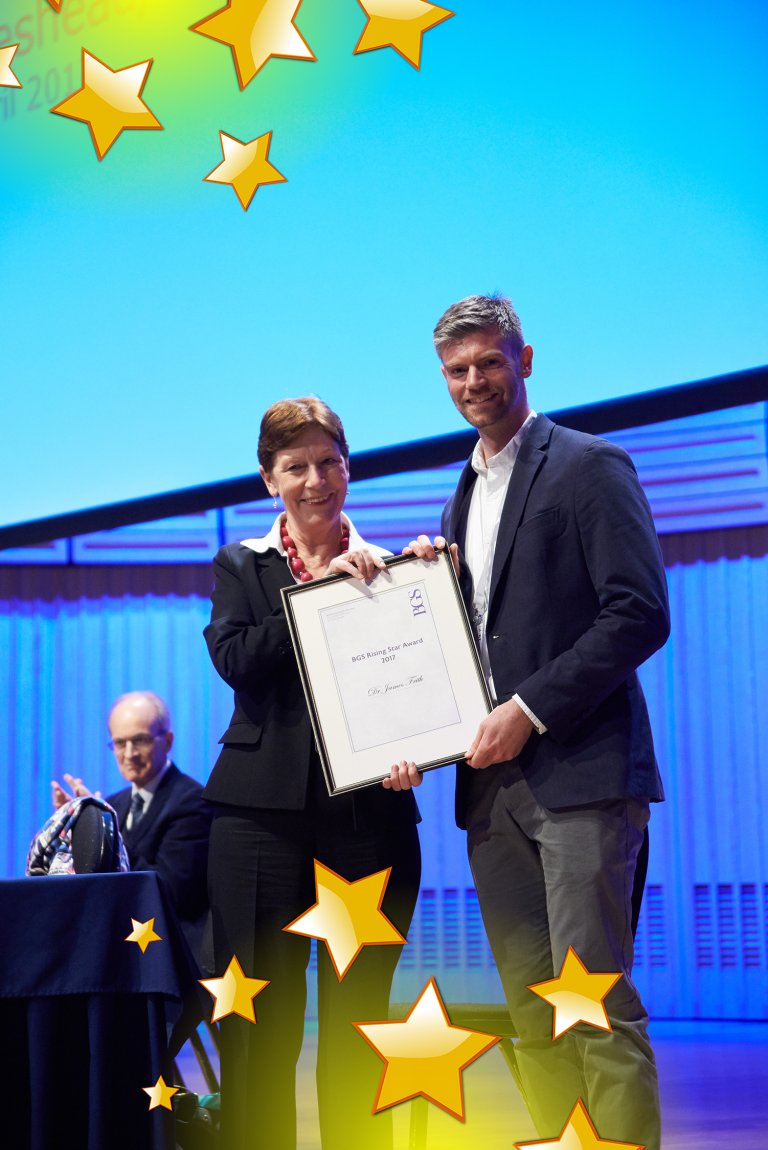Mary Ni Lochlainn is an NIHR Doctoral Fellow and Specialist Registrar in Geriatric and General Internal Medicine. She is based at the department of Twin Research at King’s College London, St Thomas’ Hospital, London. Her research focuses on frailty and sarcopenia, in particular novel ways of preventing muscle loss with age. She was awarded the BGS Rising Star Award for Research in 2021. She tweets @younggeris. Follow all the tweets via #BGSRisingStar
I am over the moon to have been awarded the BGS Rising Star Award for Research 2021. Having joined the BGS as an undergraduate student, the Society has been omnipresent throughout my clinical and academic development. From the Amulree Essay Prize to the Young Doctors Education Grant (twice!), to the European Academy for Medicine of Ageing grant, the BGS has supported me in accessing opportunities that have shaped my career thus far. The experiences gained through these opportunities as well as committee roles and at BGS meetings, have been invaluable, and I am very grateful.
As a child I gravitated towards older people and was always making pals with older neighbours in the area. I also had a very close relationship with my grandmother growing up, which heavily influenced my desire to work with older people. I sometimes find it hard to explain the appeal of working closely with older people, as they are such a heterogenous and multifaceted group. However one thing they have in common is a certain sagacity that a lifetime of experiences gives you, no matter your creed, colour, or class. As a society, we owe them everything; we wouldn’t exist without them.
My journey in the specialty started early, with the mentorship of Professor Rose Anne Kenny, who I met by pure serendipity while working part time in a shoe shop in Dublin, as a first-year medical student. I told her I wanted to be a geriatrician while selling her some shoes and next thing I knew, I was writing my first publication!
When I qualified and moved to the UK for foundation training, it was a privilege to work clinically alongside inspiring geriatricians such as Professor Steve Jackson and Dr Catherine Bryant. While the clinical work was hugely rewarding, I was keen to become more involved in research. An Academic Clinical Fellowship funded by the National Institute of Health Research (NIHR) gave me the opportunity to combine both of these things in the South London deanery, under the supervision of the inimitable Dr Claire Steves.
My research interests had centred around healthy ageing and preventing age-related diseases including sarcopenia and frailty, but this fellowship gave me the space to develop ideas further, homing in on nutrition and muscle health in older adults, and the role of the gut microbiome in this relationship. In 2019, I was awarded an NIHR Doctoral Fellowship to pursue a PhD on this topic. Working within TwinsUK, a cohort of British twins with an average age of 65 provides a wealth of existing data, and allows for recruitment of older volunteers from all around the country for prospective interventional studies and trials. My doctoral fellowship allowed me to lead a randomised clinical trial, the PROMOTe Study, looking at prebiotic and protein supplements for muscle strength in older twins, an incredible opportunity and learning experience.
During the COVID-19 pandemic, our research department mobilised rapidly to COVID research, and the PROMOTe study, alongside everything else, was put on hold. This challenging time led to research moving at a pace I did not realise was possible. Our work, combining self-reported data on a mobile app from people in the community with data from the Geriatric Medicine Research Collaborative COVID study in the hospital setting, led to the identification of confusion/delirium as a key presenting symptom of COVID in older adults, and the government subsequently changed their guidance for COVID testing to include this. Hopefully, this led to prompt diagnosis and treatment for many older adults, who have carried a disproportionate burden of morbidity and mortality throughout the pandemic. It was hugely rewarding to contribute evidence towards something which had previously been suspected by many geriatricians around the world.
I have been incredibly lucky to meet so many influential clinicians and researchers over the years, both in Ireland and the UK, but none of this would be possible without the support and inspiration of Dr Claire Steves, of whose work ethic and enthusiasm I am forever in awe. I would also like to thank the family of the late Dr Jim George, who fund this annual #BGSRisingStar Award. I look forward to a close relationship with the BGS for many years to come!


